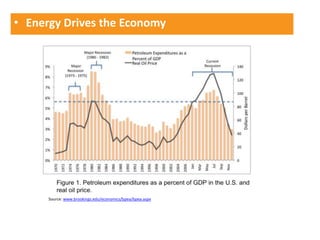
No Brainer 101
- 1. Energy Drives the Economy Source: www.brookings.edu/economics/bpea/bpea.aspx
- 2. Extractive Economy vs. Clean Economy Extractive Clean
- 3. Extractive Economy vs. Clean Economy Extractive Energy Economy Plastics, fertilizers, pesticides Transports all goods (including food) and people, “runs” the global economy
- 4. Extractive Taking from a declining source
- 5. Extractive: Not if, but when….
- 6. Clean Taking from a replenishing source
- 7. Extractive Garbage and waste
- 8. Clean Instead of waste as garbage, waste as “feedstock” Product ($) Materials Energy Non-product (waste)
- 9. Extractive As supplies dwindle, prices rise Quantity, or supply, decreases Costs increase
- 10. Clean Increasing returns, not diminishing returns Ideas as “base” for economy means a “sustainable” source; as the base increases, value and opportunity increase Clean
- 11. Extractive Energy Economy vs. Clean Energy Economy
- 12. The Extractive Economy: Huge Potential Threat
- 13. The Clean Economy: Huge Market Opportunity This “gap” can be “filled” by energy efficiency and clean energy solutions “Peak Oil” is not a question of “if” but “when…”
- 14. The Clean Energy Economy Innovations can occur in all three areas: Tech, Policy, & Markets Technologies Reducing Risk Mobilizing Capital Clean Energy Economic Growth Policies Markets Source: NREL
Notas del editor
- A bit academic and “wonky,” but this visual shows that as a percentage of our “budget” is spent on our energy needs, this impacts our ability to spend on other things. So, you see that when oil is expensive a bigger part of our budget goes for that necessity and we have less to spend on other things that drive our economy. Thus, you see recessions correlated with high oil prices.
- You will most likely be a grandparent when oil runs out; we should be thinking about what our grandchildren’s life will be like if we are not building our clean economy now…The folks that will make more money as the extractive resources become more scarce will most likely be projecting more potential future reserves and/or greater timeframes for availability, but if we know a better way of doing things now, shouldn’t we be thinking about our kids and our grandkids now too?
- The North Pacific gyre is a concentration of plastic waste in the ocean that is the size of Greenland. The beauty of a clean economy is that this waste can create a potential profit for a business that uses this as a feedstock for energy needs….Right now, in our extractive global economy, this mess is just a mess.
- The visual in the bottom right-hand of the slide is the “core” principle in sustainability. Maximizing energy efficiency and minimizing waste creates increased product and thus increased profits. As an added “bonus,” waste itself can be converted into energy with the right systems and technology. The overall beauty of a cyclical approach to business production models is that they mirror the cyclical way that the earth “functions,” making us a responsible part of our planet.
- Deutsche Bank is a pretty well respected global institution. They are very interested in the potential risks associated with rising oil prices as they are so tied to economic health.
- We have a better way to do things…if you had the choice to ride across country in a horse and buggy or to ride across country in a horse-less carriage (what we called cars back when autos were the competition) which would you pick? “Alternative” energy is a recognition that clean, renewable sources of energy are the competition for extractive energy, but it is a choice that an informed person will likely make when given the options. This movement towards clean energy is so important when we realize that as oil and other extractive energy feedstocks decline, there will not be enough available to meet growing demand. This gap between available resources and need can be made up by providing other sources of non-extracted energy and energy efficiency measures (getting more “bang for our buck” from the energy we are using).
- Technology: Innovation usually occurs in the lab, more efficient solar cells, better designs for wind power (jet stream), etc.Policies: Innovation example: Property Assessed Clean Energy (PACE) where up front costs are paid for by the city, and paid back through property taxes (like property assessments that goes towards the public good of streetlights and sidewalks)Markets: Innovation example: Power Purchase Agreement (PPA) where a company (manufacturing factory, for example) would agree to purchase power from the solar company that installs the building’s solar system at a set rate for a set number of years, and the solar company finances the up-front costs of the system itself. WE DO NOT HAVE TO WAIT FOR “TECHNOLOGY” DEVELOPMENTS TO ADDRESS THE “HIGH COST” ISSUE….Would you pay for your $250K house in cash up front? There is a better way to do things… All of these working in synergy together accelerates the development of the clean energy economy